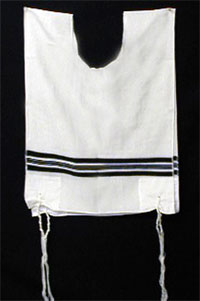Hello all,
This is a blog post I've been waiting years to write, it feels like. Ever since I've been an Israelite, I've felt very strongly against this topic, and my viewpoint is definitely an opposing one. This post is, of sorts, a response and sequel piece to the
Part I of what Israelites look like and the following
piece on tzitzit. In the aforementioned posts, pictures of Israelites were shown, and a piece of their common garb was explained. This headcovering post comes in relation to something else you may have noticed Israelite women having in common: many wear scarves on their heads, covering most or all of their hair. Now, I'd like to say something like, "I don't mean to step on any toes here", but that simply wouldn't be true. I want to step on toes, I just hope that people aren't too upset by it. It's a topic that deserves looking into, and, ultimately, I think, a way of thinking that needs to be challenged.
 |
| Pictured: an example of what I'm writing about. To avoid contention, this picture is of myself rather than any of my acquaintances. I'd like it to be noted that I was not wearing this for religious reasons; I was doing a hair treatment. |
To be up front, I am get very emotional about this topic for a couple of reasons:
- I think it's wrong
- I think it's sexist
- I think most of the women who cover their heads haven't looked into it enough, or they'd realize point 1; It's wrong.
[In being up front, I mean that my language may take on a contentious or aggressive tone. To be clear, I feel aggressive to the topic and tradition, not the people who practice it. My female friends and relatives on the whole cover their heads. I don't mean to offend people, but their sensibilities.]
It may be shocking for people with familiarity to Israelites to hear a woman use the word "sexist". The Israelite women I've met pride themselves on being meek when it comes to issues of sex. Especially in the realm of wives, Israelite women tend to give up their sense of self once they are married. They see it as the role of a wife to submit to a husband and to avoid challenging the status quo. I do not follow in this line of thinking. I am, I suppose, what could be called an Israelite Feminist. I am also a Masculist; I do not believe women are better than men. I do not believe men are better than women. Rather, I believe that both sexes depend on and need each other in order to experience happy and fulfilled lives. Therefore, we cannot marginalize or oppress one sex when their is no call for it. I do want to note that my argument against headcovering does not come from this thought, but from the Bible, as it should.
A Person's Ownership of Self
To start, let's address the idea that an Israelite woman should submit to her husband. This idea, indeed, comes from the Bible, though I think it is misinterpreted by modern Israelites. One such verse is Ephesians 5:22, "Wives, submit yourselves unto your own husbands, as unto the Lord." (Other verses saying much the same thing include Colossians 3:18, Titus 2:5, 1 Peter 3:1, and so on. If you're curious, type "wives obey husbands" into google for more verses). Israelite women take this verse as commanding them to obey their husbands in every point--do we not obey God thusly? God should be obeyed immediately, without question, always. No one (by this I mean religious people) disputes this point. If we are to obey husbands as we obey God, we should also obey them immediately, without question, always.
However, the question follows; what if a husband is ungodly?
If an Israelite woman is married to a non-Israelite man, or a man with a different understanding of the Law, should she obey him if he commands her to eat pork? To feed it to her children? If told to do so by her husband, should a woman work on the Sabbath? Or commit murder? Let the questions ruminate for a while.
The answer: OF COURSE NOT. The law of God supersedes the commands of man, always. Acts 5:29 reads as follows, "But Peter and the apostles answered, “We must obey God rather than men..." Therefore, if a man commands his wife to do something against the law of God, she should not obey. Every individual person is responsible for their own actions and their own obedience to God.
The points to take from this section: wives should obey husbands, assuming the husbands do not command their wives to do anything that would contradict the Law of God. However, as it would seem, wives must still obey husbands in any other nit-noi thing he should require of her. If he says "jump", while jumping, she should ask, "how high?". This is where many Israelite women stand on this verse--"jump" leads to "how high?".
What is often ignored is the companion verse to Ephesians 5:22, being Ephesians 5:25, "Husbands, love your wives, even as Christ also loved the church, and gave himself for it". Husbands must love their wives. They must treat their wives as Yeshua treated the church. This is a commandment. Yeshua did not make ridiculous demands of the church to suit his own ego. Yeshua did not micromanage the church on the every day aspect. Rather, he kept the church in line in regards to the proper following of the Law, forgave its past misdemeanors, and ultimately died for it.
Ephesians 5:25 is followed by Ephesians 5:28, which restates in greater detail, "So ought men to love their wives as their own bodies. He that loveth his wife loveth himself." A man should love his wife as he loves himself. Indeed, he should put his wife before himself, her needs before his, as Yeshua did for the church. He put the church's need for redemption over his own desire to live.
Conclusion: A man should love his wife more than himself; he should care for her; he should lead her in her following of the law; he should forgive her when necessary, and he should serve as a role model. In short, husbands should not be tyrants. If a husband acts like a tyrant, he is acting contrariwise to the law and to his duties as a husband.
The Origin of the Head Covering: Letters from Paul
By now, you may be wondering, what does all that have to do with headcovering? The answer: Everything. The idea that women should cover their heads depends on the arguments above. Let's get into the actual head covering now.
The idea behind women covering their heads come largely from First Corinthians. Some background on this book is given in Sven's
article on long hair on men. To sum it up, this book is a letter written by Paul to the Corinthians in regards to specific problems they were experiencing in their church/churches. Corinth was known to be a sexually-loose city, and many of their issues revolve around issues of prostitution, adultery, and general wantonness. It should be noted, before we begin, that this command by Paul is only issued once--in his letter to Corinth.
In 1 Corinthians 11:5-6, Paul writes, " But every woman that prayeth or prophesieth with her head uncovered dishonoureth her head: for that is even all one as if she were shaven. For if the woman be not covered, let her also be shorn: but if it be a shame for a woman to be shorn or shaven, let her be covered." The modern version of that would be as follows, "Every woman who prays or prophesies without a headcovering shames herself; that action is the same as being bald. If she won't cover her head [while doing those things], she should be shaved. But if she doesn't want to be shaved, she should cover her head [while doing those things]".
Okay. So, Paul says women should pray and prophesy with their heads covered. Unless they're okay with being bald, in which case, they should just be bald. The key word in the above verses is "if". If a women prays/prophesies uncovered, she might as well be bald. If being bald would shame her, she should cover her head. If. What if she doesn't mind being bald? My point is this; the verse is not an ultimate command, "ALL MARRIED WOMEN MUST COVER THEIR HAIR, THUS SAYETH THE LORD", as Israelite women tend to take it. It's an if-than statement. Women who pray/prophesy should cover their heads while doing so unless they're bald and okay with it.
Nowhere in the verse does it say all women, at all times, must cover their hair. Nowhere does it specify married women. The word translated as "woman" comes from the Greek, "
gunh", which can be used to mean "wife", but also "woman" "a woman of any age--virgin, married, widow". In short, it means a female of the human species. In Greek, there was not a separate word for "woman" or "wife", rather, the world used, "gunh" means "female", and context is used to determine the status of that woman (
link).
Where we are now on that command: a woman should cover her head when she prays of prophesies unless she's okay with being bald/already bald.
Assuming a woman likes her hair and would like to hold on to it rather than shave it, the counter might be made, "But if we're meant to cover our head while we pray, shouldn't we pray all the time? 1 Thessalonians 5:17 says so! Therefore, our heads should be covered with a headcovering always!" (The verse in question is, "Pray without ceasing.").
I refute the question thusly; yes, we are told to pray without ceasing. If we were required to wear a headcovering every time we prayed.....how would we bathe? How would we wash our hair if it must always be wrapped in a cloth? What if, while bathing, our house caught on fire and we were forced to flee? Could we not pray until we had secured a length of cloth with which to bind up our hair? What if you were person lost in the jungle for many years, without resources or clothing--would you not be allowed to pray while you didn't have a cloth with which to wrap your hair? The line of questions may seem silly, but think about it. Does a female's relationship and communication with God rely upon her having cloth to wrap around her hair? No. No and no. A piece of cloth is not required in order for a woman to talk to God, nor is it required to prophesy.
Note: I did not say the action of covering one's head is not required. I said a piece of cloth is not required. (and, we're still working on the assumption the woman in question doesn't want to be bald)
Conclusion: a head covering is required when a woman prays or prophesies only if she would rather not be bald.
The Real Reason for Covering
To figure out what can be used as a head covering while praying or prophesying for women who don't want to be bald, we need to return once more to the Bible to look at the context. The reasoning given in 1 Corinthians 11:7 is summarized as follows: women should cover their heads while praying and prophesying because while a man is the glory of God, a woman is the glory of man. We know the order of creation from Genesis; God made Adam from dust and His breath, and Eve came from Adam's rib. So, to avoid giving too much credit to men, while women pray and prophesy, they should cover their heads. Fair enough. We were made second. We were made from another creation rather than scratch. The act of covering is showing a recognition of that fact.
So, what is the covering? It is a show of recognition of one's place. It is an act of humility. It is showing deference to God. It is not cloth. Cloth could be used, sure. Cloth is effective at covering stuff. But, it is not required. A person is able to worship God with nothing but their body--God is not a capitalist--he doesn't make us buy things. What can be used to show the deference suggested? Well, a hand. A piece of wood. A leaf. A hat. A book. It is the act that is important, not the item.
Conclusion: A woman should cover her head in deference for God, and a covering can be anything that works for that purpose.
A Return to the Idea of Husbands; Deciphering Paul
Another popular reason Israelite women give for wearing their head coverings at all times is that they are "showing respect" for their husbands. As we learned in the Ownership of Self section, no husband has the right to demand a head covering from his wife unless it is in accordance to the law. As we learned in The Origin of the Head Covering, a head covering is not required by God. As we learned in The Real Reason for Covering, the covering is not any one physical item. Therefore, there is no basis whatsoever for a man to require his wife to cover up her hair. However, these women are mostly doing it out of their own volition; their husbands have not asked, but the wives have offered. Let's study the basis behind why a wife might do this.
Like requirement for praying and prophesying, the idea that a woman should cover her hair for her husband comes from Corinthians 11. This idea comes from verses 7-10:
"For a man indeed ought not to cover his head, forasmuch as he is the image and glory of God: but the woman is the glory of the man. For the man is not of the woman: but the woman of the man. Neither was the man created for the woman; but the woman for the man. For this cause ought the woman to have power on her head because of the angels."
In this section, Paul is explaining his statement in verse 5--that a woman is shamed by praying/prophesying uncovered. He is not adding another rule; he is explaining the original one. He explains a woman should cover her head as she was not the original human creation; she was made second to be a partner to the man. The confusion comes in when people assume Paul is making an addition rule rather than adding information. The point of focus is usually the "woman is the glory of the man". They tie this in with verse 15, " But if a woman have long hair, it is a glory to her: for her hair is given her for a covering". Mistakenly, they twist these two together into the following thought; if a woman's glory is her hair, and women are the glory of men, then a woman's hair is the glory of the man. If a woman is to cover her head because she is the glory of the man, and her hair is the same as herself, then she should cover her hair rather than her head.
This is a mistaken way of thinking for many reasons:
- The verses about glory and man are support for his original statement rather than stand-alone rules.
- Paul says a woman is the glory of a man--Not that a woman's glory is the glory of a man.
- Paul specifically states that a woman should cover her head, not her hair.
- If Paul had meant hair, he would have said hair. He's straight forward enough in the rest of the chapter.
- When we understand the terms "woman" to mean "woman" rather than "wife", and "man" to mean "man" rather than "husband", the connection between an individual woman's hair or head and an individual man's glory is broken. Paul is referring to womankind and mankind. Women are a glory to men. Plural.
Conclusion: Hair is not the issue Paul is talking about, nor is the role of husband or wife. A woman's hair is her glory, but her glory only matters so long as she would like to have it and prays and prophesies accordingly.
"A Man's Glory"
Ignoring the previous revelation of man and woman vs. husband and wife, when Israelites confuse the issue, they believe a woman's hair is tied in with her husband's glory. Let's observe this thought, as well. Their logic is as follows; because it is a man's glory, it should be hidden. Men should be humble, therefore, their glory should be hidden from all but themselves.
By definition, glory is "very great praise, honor, or distinction bestowed by common consent; renown" or "something that is a source of honor, fame, or admiration; a distinguished ornament or an object of pride". To be "glory" or "gloried", a thing must be known. If a woman's hair were to be covered, it would be literally impossible for it to be the glory of her husband. The only way for it to be a glory is if it were a "distinguished ornament of pride" or a "source of fame". Covered and hidden hair is none of these things.
An example from the Bible that proves this logic is Proverbs 20:29, "The glory of young men is their strength, gray hair the splendor of the old." Strength can be hidden, but in Israel, it was not. Historical Israelites were a war-like people. The men were expected to go to war whenever necessary and to fight for their lives, people, and country. They did not hide their strength. The splendor of the old is their gray hair. Gray hair can be covered, but it was not. In Leviticus 19:32 (ESV), we are told, "You shall stand up before the gray head and honor the face of an old man..." If the splendor of the old was hidden, how would we know whom to stand up for? Obviously, the glory of man was not hidden, nor was their splendor. Indeed, it was a source of respect. If a woman's hair was a man's glory, it should not be hidden; it should be a source of respect.
Conclusion: Even if Paul were speaking of husbands and wives, and even if a wife's glory was tied in with a husband's, by definition, glory must be known of and recognized; therefore, hidden hair is no one's glory.
The Argument of Modesty
Another common argument for a woman covering her hair is that of modesty. It is often linked to the (wrongful) idea of husbands and wives and glory discussed above. A wife should be modest, and should cover her glory. Ignoring the point made above about glory for a moment, let's study the rules of modesty.
In 1 Timothy, 2:9-10, we learn women should, "...adorn themselves in modest apparel, with shamefacedness and sobriety; not with broided hair, or gold, or pearls, or costly array; but with good deeds, appropriate for women who profess to worship God." Timothy states women should be noticed for their good deeds rather than their fancy clothing or jewelry. Fair enough, but we still don't have a definition for what makes apparel "modest". 1 Peter 5:5 exhorts for us to "...be clothed in humility..." but that is more about action than clothing. Other verses on the subject say much the same. For all my studying, I could not find one solid list on what exactly "modest" clothing is. Rather, it seemed to be about attitude.
The closest thing I could find to a list of what counted as "modest" comes from Isaiah chapter 47. In this chapter, a promise is made about the downfall of Babylon, "Come down, and sit in the dust, O virgin daughter of Babylon, sit on the ground: there is no throne, O daughter of the Chaldeans: for thou shalt no more be called tender and delicate. Take the millstones, and grind meal: uncover thy locks, make bare the leg, uncover the thigh, pass over the rivers. Thy nakedness shall be uncovered, yea, thy shame shall be seen: I will take vengeance, and I will not meet thee as a man." The women of Babylon are given a curse, of sorts. They are told to show their hair, bare their legs, uncover their thighs. They are told their "nakedness" will be uncovered, to their shame. So, does hair count as part of their nakedness? Paul would not say so.
As stated in 1 Corinthians 11:15, a woman's hair is her glory,
given to her as a covering. Note, "
a covering". Hair is not nakedness; indeed, it is a type of covering. So, in Isaiah, the nakedness of the women comes from their legs and thighs. The work translated nakedness comes from "dexr" (English equivalent of Hebrew word) pronounced "er-vah", meaning "nudity, especially the pudenda" (
link). "Pudenda" is a word referring to the genitals, especially those of a woman (
link). The curse upon these women isn't for their hair to be seen, but their genitals and thighs. [Note: The word leg and locks in this verse are both originally a type of clothes...rather than talking about body parts, those refer to types of clothing. Only the "thigh" and "nakedness" refer to body parts].
As far as modesty laws, all we know is that the thighs and genitals are right out.
Let us observe a moment where a woman's hair is revealed around Yeshua and how he reacts. In John 12:3, Mary, sister of Lazarus and Martha, pours "very costly" perfume on the feet of Yeshua and proceeds to wipe his feet with her hair. Her hair, specifically,
the hair of her head. Now, if modesty rules equated the hair to nakedness, Yeshua would likely have fainted with shock. What she did would be the equivalent of a pleasant-smelling naked lap dance. Even if Yeshua understood her true intent, the disciples, who were in the room, would have been outraged. A single woman, in a household of men,
revealing her nakedness and wiping it on the feet of the son of GOD?!!!! But, because hair and nakedness have nothing to do with each other, nothing of the sort happens. Yeshua is not shocked. The disciples are not outraged. In fact, the only complaint made is that the perfume she bought was too expensive and the money would have been better spent on the poor (John 12:4-5).
Another argument Israelite women use is that men are attracted to a woman's hair, and women should cover it to avoid being "tempting". "A woman's hair should be private, for her husband," they say, "so I cover it so that only my husband can experience it". For one, this has no Biblical basis; it's tied up in the whole "glory" thing we've already spoken about. For two, if the goal of covering one's hair to avoid being attractive to men, then, while the woman has her hair covered, her husband should not find her attractive. Talk to any Israelite man with a wife who covers her hair, and you will quickly find it is not the case. They say proudly, "Our women are so modest and beautiful; they always cover their hair and never wear anything but a skirt" (don't get me started on skirts. We'll go there on another day). First off, if the goal is to be modest, should the husbands be feeling prideful? Should they not find their wives homely, bland, even repulsive? But, they are prideful, and they do not feel repulsed or apathetic to their wives' looks.
Let us consider other cultures that preach a woman should cover her hair or body to avoid inciting the lust of men. Islamic nations and India come to mind. In many Islamic nations, it is illegal for a woman to be seen by anyone not a relative. The Afghani burqa, for example, is designed to cover every female aspect of the body but the eyes, and, sometimes, even the eyes are screened off. How successful is this measure in repressing the sexuality of men?
 |
| Surely this is enough to quench the lusts of men? |
Let's talk about the sexual crime rate in Afghanistan. According to Younis Payan, deputy of the United Nations Population Fund in Afghanistan, 25% of women living in Afghanistan face sexual violence (
link). That's one out of every four women. Their burqas did not save them. In India, 20% of men admit to raping their wives or significant others. Their saris and modest clothes did not save them from the violence of men (
link).
That is because, in life, and according to the Bible, as spoken by Yeshua, no woman is responsible for a man's lust. A man's lust is his sole responsibility. Yeshua says, "But I say unto you, That whosoever looketh on a woman to lust after her hath committed adultery with her already in his heart." (Matthew 5:28). The women is not responsible; the woman has not committed adultery. The man has. Because, as demonstrated by India and Afghanistan, (and many more countries), changing a woman's clothes won't stop men from being attracted to them.
When an Israelite woman covers her hair to "avoid tempting men", she is taking the blame for something that has nothing to do with her. She is trying to control something she has no power over. Her head covering, at the end of the day, will not help her avoid inciting lust, but, also, that isn't her problem.
Conclusion: Modesty is more about attitude than specific clothing, and hair has absolutely nothing to do with modesty, and thus need not be covered. If a man feels lusty towards a woman, it is his fault, and nothing she did excuses his feelings or actions.
The History Argument
The last argument I've heard for women wearing head coverings is that we should act as the ancient Israelites did. Historic Israelite clothing for women included some sort of cloth head covering. Some laws and punishments, such as that of the
possibly unfaithful wife, include a step of taking a woman's veil off.
However, this only evidences that women did wear veils, not that all women must wear veils. But, for this, our final refutation, we're going to do some comparative and backwards-working logic. In 1 Corinthians 11:4, we are informed, "Every man praying or prophesying, having his head covered, dishonoureth his head." Using the logic of pro-head-covering, a women should have her head covered at all times, to allow her to pray and because ancient Israelite women wore head coverings. If the logic here was true, men, dishonored by covering their heads during prayer, should absolutely never cover their heads in any way.
But, when we look to the past, not only did Israelite women wear head coverings as part of their daily outfits,
so did Israelite men. They wore helmets in war, cloth "
veils" for the everyday, High Priests of the temple were even
required to wear a
certain type of head covering!
 |
| Representation of typical Israelite garb |
The clothing of the time and region was cultural rather than religious. Middle eastern men continue to dress this way
to this day. It's because it makes sense to their climate. When it is hot outside, having some protection from the sun on one's head is a matter of common sense. Looking to the past and copying what they did without question will not solve our problems. Yes, Israelite woman wore head coverings. So did men. They also regularly fell into idolatry and sacrificed their own children. Context is needed before judgement is made.
Conclusion: The historical garb of the Israelites had more to do with common culture and ethnicity than with religion. Women in ancient Israel wore head coverings, but that does not mean we should do so.
So.....Why?
As I hope to have established, their is no basis for women wearing headcoverings all day every day as a way of life. There is no Biblical basis, modesty basis, historical basis, or husband-obeying basis. Why do more people not realize this?
The answer is simple.
It is a tradition of men. "For laying aside the commandment of God, ye hold the tradition of men" (Mark 7:8). Because "other people" cover their hair for modesty--Jews, Muslims, Amish, Mennonites, some Hindus--we feel pressure to define modesty in the same way. We forget to look to the Bible and God's law to find the truth.
It is a symptom of sexism. Many of the Israelites have come out of Christian churches. Christian churches hold on to the idea that women are somehow "less than". After all, did not Eve tempt Adam and bring sin into the world? (They ignore that God blamed
Adam for that). Was not Mary Magdalene a prostitute? (No. She wasn't. There is no scriptural support for this, though that
would have made her hair lapdance even more scandalous). This feeling is carried over in the men and women who become Israelites, and they latch onto the barest excuse to oppress women, citing holiness, ignoring what is plain to see, with a little legwork.
Final Conclusion
Dear Israelite sisters, you can cover your hair as much and as strictly as you like on an everyday basis. But, I want you to know, and to be free in the knowledge, that there is no reason for you to. Your husband is not a reason. Your modesty is not a reason. Your holiness is not a reason. The only reason to do this is because you want to.
Also, knowing what you do now, please, stop saying you cover your hair for God.
He doesn't want that; He doesn't require it; He doesn't ask for it. Stop saying you do it to honor your husband. It doesn't honor him, if anything, it hides a source of honest pride. Believe in yourself and be secure and happy in your body. Your hair is not an excuse for anyone to do a wrong; you will be tempting or not no matter what you do or what you cover.
Yes, be known for your works, but do not keep yourself from enjoying life. The point of being Israelites is that we are answerable only to God; His yoke is easy and His burden is light.
Thank you.


































